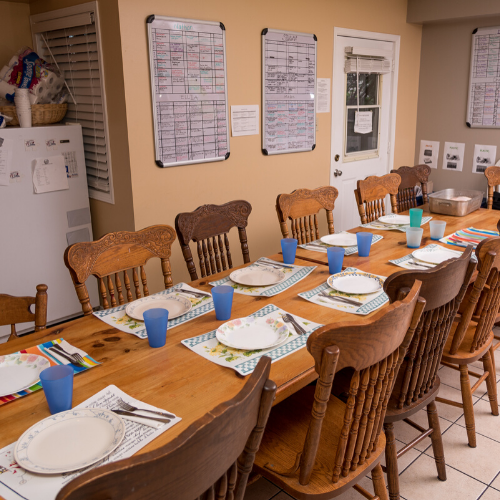Program Profile: The Manor
By Jennifer Young, Program Manager
Originally published January 2017
History
The Manor began in 1988 as “Kinrade House” in East Hamilton as a life-skills teaching residential program to enable young adults with ASD to prepare for life living independently. When the current location on the Hamilton Mountain was built in 1992, the program expanded – as individuals learned skills they would move into the Semi-Independent Living (SIL) townhouses next door to practice these skills under the watchful eye of staff before moving into other housing in the community. The initial concept was quite ground-breaking. With changes to Ministry funding over time, the Manor program now supports adults who will require more supports throughout their lives but the program and staff continue to support ongoing learning so individuals are as independent as possible.
How The Manor Came To Be
The program was developed due to a need identified at Canada House when two youth with an autism diagnosis entered the program. At the time, Dr. Peter Szatmari was beginning to develop Hamilton Health Sciences Autism Services and supported Woodview in developing services for adults with autism. The idea for the program was ‘pitched’ and accepted.
Who We Serve at The Manor
We provide services to adults with a diagnosis of autism, though many have co-occurring mental health or other diagnoses. We start providing services when people age out of childrens’ services (at 18 years old) and throughout their adult years. We have long-standing relationships with many of our program participants, a number having started services with us as children and youth and who have been with the program for upwards of 20-30 years.
Day-In-The-Life of the Manor Program
A typical day at the Manor involves supporting our program participants in moving through their individualized schedules, assisting them in actively participating in their communities, helping them to make choices that lead to positive outcomes (i.e. support with budgeting of finances, healthy living), etc. We assist our program participants to become more independent through active participation in ongoing learning opportunities in the areas of life skills, social skills, self-advocacy, and more. For some, this may include things like staff developing, implementing, and monitoring reinforcement systems to help a program participant wake up and move through their morning routine in a timely manner so that they make it to their volunteer placement on time. For others, staff may accompany them to medical and/or mental health-related appointments in order to provide support, assist with advocacy, promote understanding of recommendations made by health professionals, etc.
Each evening of the week we provide groups/activities that encourage independence, social activities among friends, physical fitness, community involvement, generalization of skills, and having fun!
Stand Out Memory
A few years ago one of our longest served clients was diagnosed with cancer and needed a great deal of support navigating the medical system and often just someone to be with her and care for her. Her parents had passed away a number of years before; she had no siblings, and only a couple of cousins who saw her occasionally. As always, our staff at the Manor jumped in to help. We attended medical appointments with her, advocated on her behalf to get her the care she needed, helped her move into a home for seniors where she would receive nursing care and visited with her daily to show her that there were people out there who truly cared for her. The night before she suddenly passed away, our staff was with her, holding her hand, chatting and just being with her. At one point, late in the evening as staff were getting ready to leave, she looked up, squeezed the staff’s hand and said “I love you, you know….I really do.” and with genuine honesty the staff shared their love for her as well and said goodbye, hoping to see her again the next day. Though it was a terribly sad loss for our Woodview Manor family, it meant a lot to our staff that we were able to surround her with support and love not only through the years we supported her before her illness but particularly during her final months when she needed us most. We are blessed to have this incredible woman’s artwork displayed both here at the Manor and at Head Office. Take a minute to enjoy her pieces next time you visit either of these locations; they are her legacy and something we know she would be thrilled to continue to share with the world.
Referral Process
Vacancies within any adult program are declared to Developmental Services Ontario (DSO). All referrals for adult services come through the DSO and all referrals must live within the Hamilton region.
Quirky Fact
The Manor continues to support some adults who were our very first adults with autism that started in the program. We affectionately refer to them as “The Originals”, which they feel quite proud of! Many adults within our programs have been ‘grandfathered’ into the adult system and do not need to meet the new IQ eligibility criteria for accessing Developmental Services in Ontario. This is a good thing because though many of our program participants may have IQs above the DSO’s eligibility criteria, all of them still require a great deal of formal services and supports in order to live healthy, happy, and fulfilling lives.

